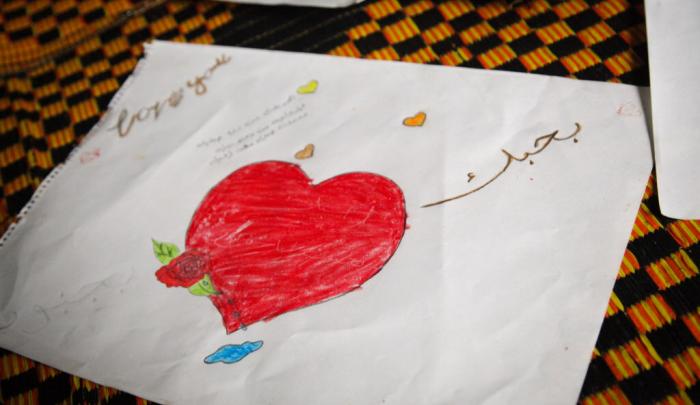
BEIRUT (March 14, 2014) — As the crisis in Syria reaches the end of another year of brutal violence today, five of the world’s leading aid organizations say that the three-year old conflict has devastated the lives of millions of children and young people – and a generation is at risk of being lost forever.
The heads of UNICEF and UNHCR and senior representatives of Mercy Corps, Save the Children and World Vision International came together for a joint visit to Lebanon, to draw attention to the harrowing impact of over three years of conflict on 5.5 million Syrian children living in Syria and as refugees in neighboring countries. They highlighted the unending cycle of violence, displacement, worsening health, disruption to education and learning, and serious psychological impact on millions of children.
“For three horrific years, millions of innocent children have been living a childhood that none should endure. The children of Syria cannot, and must not, face another year of this horror — the violence and cruelty that has scarred their lives for three long years,” said UNICEF Executive Director Anthony Lake.
Over the weekend, the five organizations made a united call for an end to fighting, urgent implementation of the UN Security Council resolution granting unrestricted access across Syria for impartial humanitarian organizations, more investment in helping children heal both physically and emotionally, more support for learning and skills development and intensified effort to decrease the economic impact of the crisis on host countries notably Lebanon, Jordan, Iraq, Egypt and Turkey.
1.2 million children are now living as refugees in host countries, almost half a million in Lebanon alone. 37,000 refugee children were born since the conflict began.
“Syrians represent the largest population of forcibly displaced people in the world. And there are more uprooted children from Syria than from any other country,” said António Guterres, the UN High Commissioner for Refugees. “They need and deserve to be protected, healed and educated.”
The conflict has destroyed vital infrastructure, on which children depend for their health. Sixty per cent of health centers inside Syria have been destroyed, and one-third of water treatment plants have broken down, while vaccination rates have plummeted, seeing a resurgence of deadly illnesses including polio.
Save the Children’s Chief Executive, Justin Forsyth said, “The situation for children and their families inside Syria is unimaginable. Doctors have told us of sick children who are unable to be treated because of the collapse of the health service. We know of children who have been tortured, starved or targeted in attacks. More than 2.5 million people have fled to neighboring countries. In Lebanon alone there are close to 1 million registered refugees – as many as 200,000 of these are children who are under four years old. Hundreds of thousands of children are growing up having known nothing but the horrors of this war and the chaos and uncertainty that it has bought to their young lives. It has to stop. ”
The threat to long term prospects for a more stable and prosperous Syria is also underlined by the collapse of the education system for the children upon whom the future responsibility for leading the country will ultimately fall –nearly 3 million children are now not attending classes on a regular basis, and one-fifth of schools in Syria has been destroyed, damaged or used for military purposes.
“Children are telling our staff in the field, daily, that they’ve had enough,” said Conny Lenneberg, World Vision’s regional leader for the Middle East and Eastern Europe. “They’re desperate for things to change. They are the ones who are bearing the brunt of this conflict. When they’re out of school for too long, they know they won’t go back. They know far more about violence and insecurity than many adults do. They feel as though they are being forgotten. It’s time that we all came together to push harder for a peaceful end to this conflict, and to ensure that all affected children are protected and cared for, right now.”
A critical group affected by the conflict are adolescents –Syrian boys and girls between the ages of 13 and 18 – who, the agencies say, are trapped between hope and hopelessness. Fostering the skills and behavior they’ll need today is essential in order to better prepare them to contribute positively to Syria when they return home
“Consider the scale at which children and adolescents here in Lebanon and in Jordan, let alone in Syria, have been experiencing stress and trauma – we run the risk of having an entire generation of children predisposed to act violently because they feel there is nothing to lose,” said Mercy Corps’ Vice President of Global Engagement and Policy, Andrea Koppel.
Earlier this year, the five key organizations unveiled the $1 billion “No Lost Generation” strategy to improve education opportunities and strengthen psychological protection for children affected by the conflict – vital if children are ever to recover from their experiences and gain the skills and knowledge they will need to play a role in the rebuilding of Syria in the years ahead.
“If the world could turn back the clock two years or more, knowing the devastation to be caused by the conflict, surely it would have done more to end it then,” said Anthony Lake. “Imagine what it will be like a year from now, as the human costs continue to rise. It is time to say ‘Enough’.”
– END –
About World Vision:
World Vision is a Christian humanitarian organization conducting relief, development, and advocacy activities in its work with children, families, and their communities in nearly 100 countries to help them reach their full potential by tackling the causes of poverty and injustice. World Vision serves all people regardless of religion, race, ethnicity, or gender. For more information, please visit www.WorldVision.org/media-center/ or on Twitter @WorldVisionUSA.
Highlights
- Risk of a lost generation say leading aid agencies